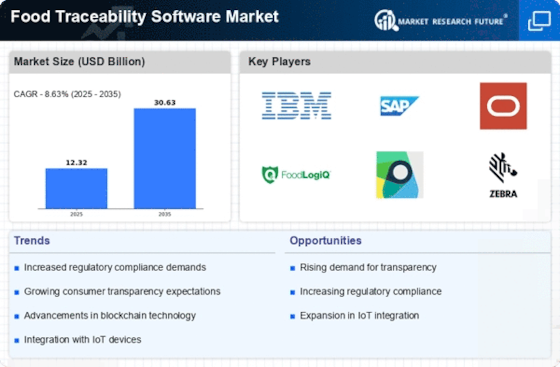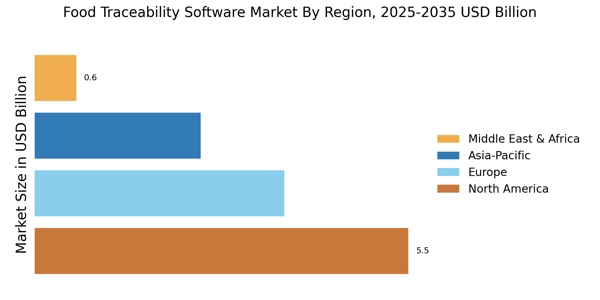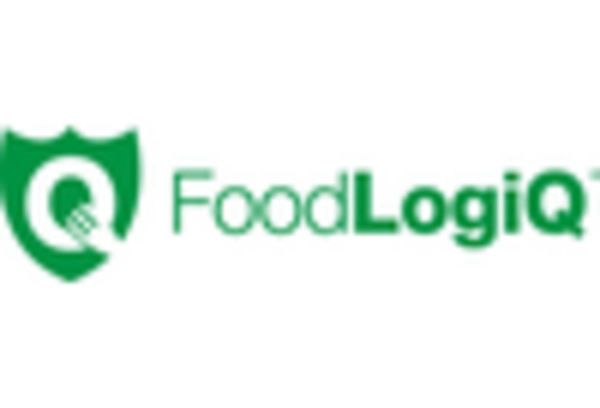Sustainability Initiatives
Sustainability initiatives are emerging as a key driver in the Food Traceability Software Market. As environmental concerns gain prominence, consumers and businesses alike are prioritizing sustainable practices in food production and distribution. Traceability software enables companies to monitor and report on their sustainability efforts, such as sourcing from responsible suppliers and minimizing waste. This alignment with sustainability goals not only enhances brand reputation but also meets the growing consumer demand for ethically produced food. Recent studies indicate that nearly 60% of consumers are willing to pay a premium for products that are certified sustainable. Consequently, the Food Traceability Software Market is likely to witness increased investment as companies strive to integrate sustainability into their operations.
Technological Advancements
Technological advancements play a pivotal role in shaping the Food Traceability Software Market. Innovations such as blockchain technology, IoT devices, and artificial intelligence are revolutionizing how food products are tracked and traced throughout the supply chain. These technologies enhance data accuracy and provide real-time insights, which are crucial for effective traceability. For example, blockchain offers an immutable record of transactions, ensuring that all stakeholders have access to reliable information. As businesses increasingly recognize the benefits of these technologies, the demand for sophisticated food traceability software is expected to rise. The integration of advanced technologies not only improves operational efficiency but also strengthens consumer confidence in food safety, thereby driving market growth.
Enhanced Consumer Awareness
The Food Traceability Software Market is experiencing a notable shift driven by heightened consumer awareness regarding food safety and quality. As consumers become increasingly informed about the origins of their food, they demand transparency from producers and retailers. This trend is reflected in the rising adoption of traceability solutions, which allow businesses to provide detailed information about product sourcing and handling. According to recent data, approximately 70% of consumers express a preference for brands that offer traceability features. This growing expectation compels companies to invest in food traceability software, thereby propelling market growth. Furthermore, as consumers prioritize health and sustainability, the Food Traceability Software Market is likely to see continued expansion as businesses strive to meet these evolving demands.
Global Supply Chain Complexity
The complexity of The Food Traceability Software Industry. As food products are sourced from multiple regions and undergo various processing stages, ensuring traceability becomes increasingly challenging. This complexity necessitates the implementation of robust traceability solutions that can track products from farm to fork. Companies are increasingly aware that effective traceability can mitigate risks associated with recalls and contamination, which can have severe financial implications. The market is projected to expand as businesses seek to enhance their supply chain visibility and responsiveness. By investing in food traceability software, companies can better manage their supply chains, ensuring compliance and maintaining consumer trust.
Regulatory Pressures and Compliance
Regulatory pressures are a significant driver in the Food Traceability Software Market, as governments worldwide implement stringent food safety regulations. Compliance with these regulations is essential for food businesses to avoid penalties and maintain consumer trust. For instance, the introduction of the Food Safety Modernization Act in various regions has necessitated the adoption of traceability systems to ensure accountability throughout the supply chain. The market for food traceability software is projected to grow at a compound annual growth rate of 10% over the next five years, largely due to these compliance requirements. Companies that fail to implement adequate traceability measures risk facing legal repercussions and reputational damage, further emphasizing the importance of investing in food traceability software.

















